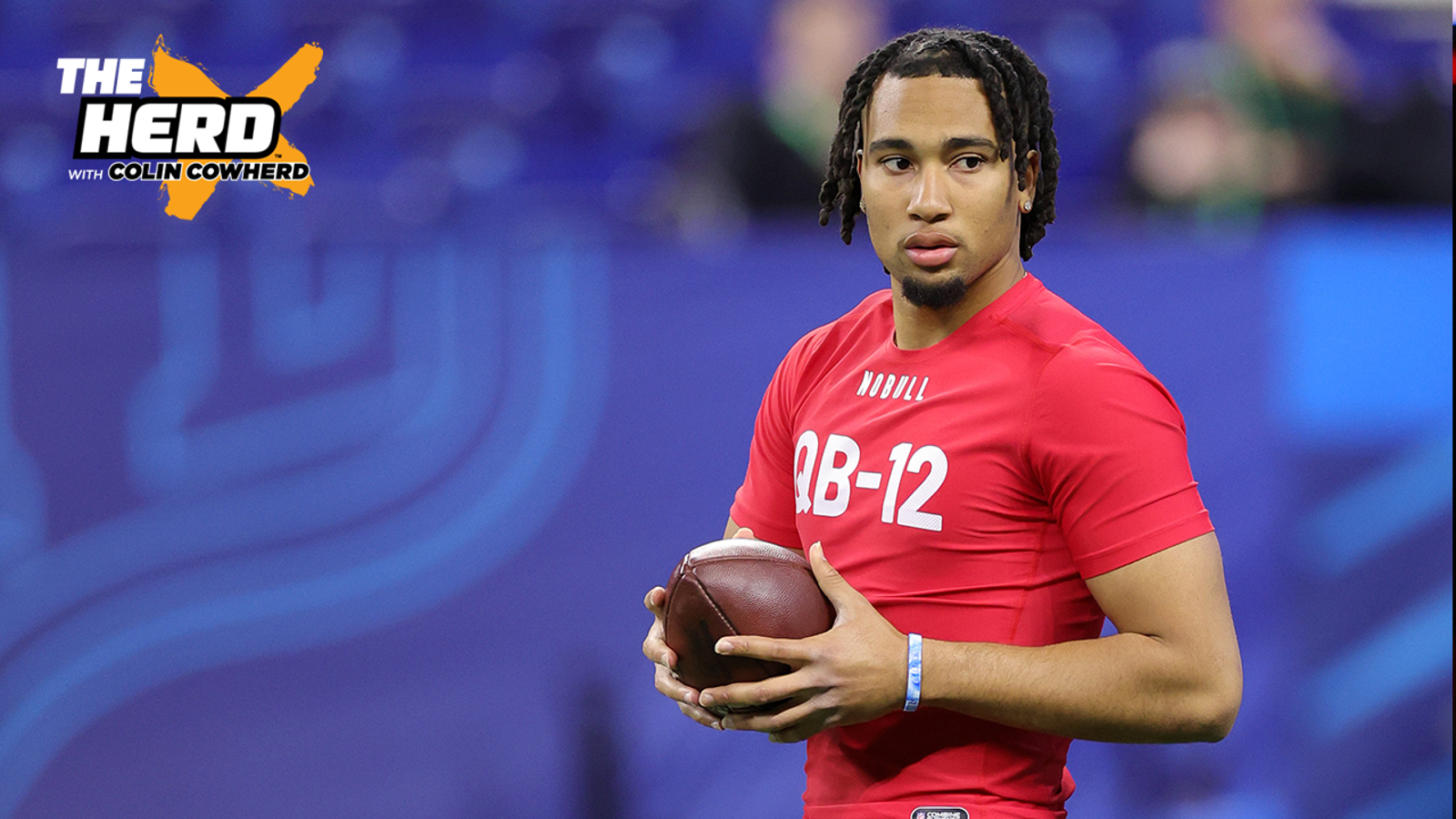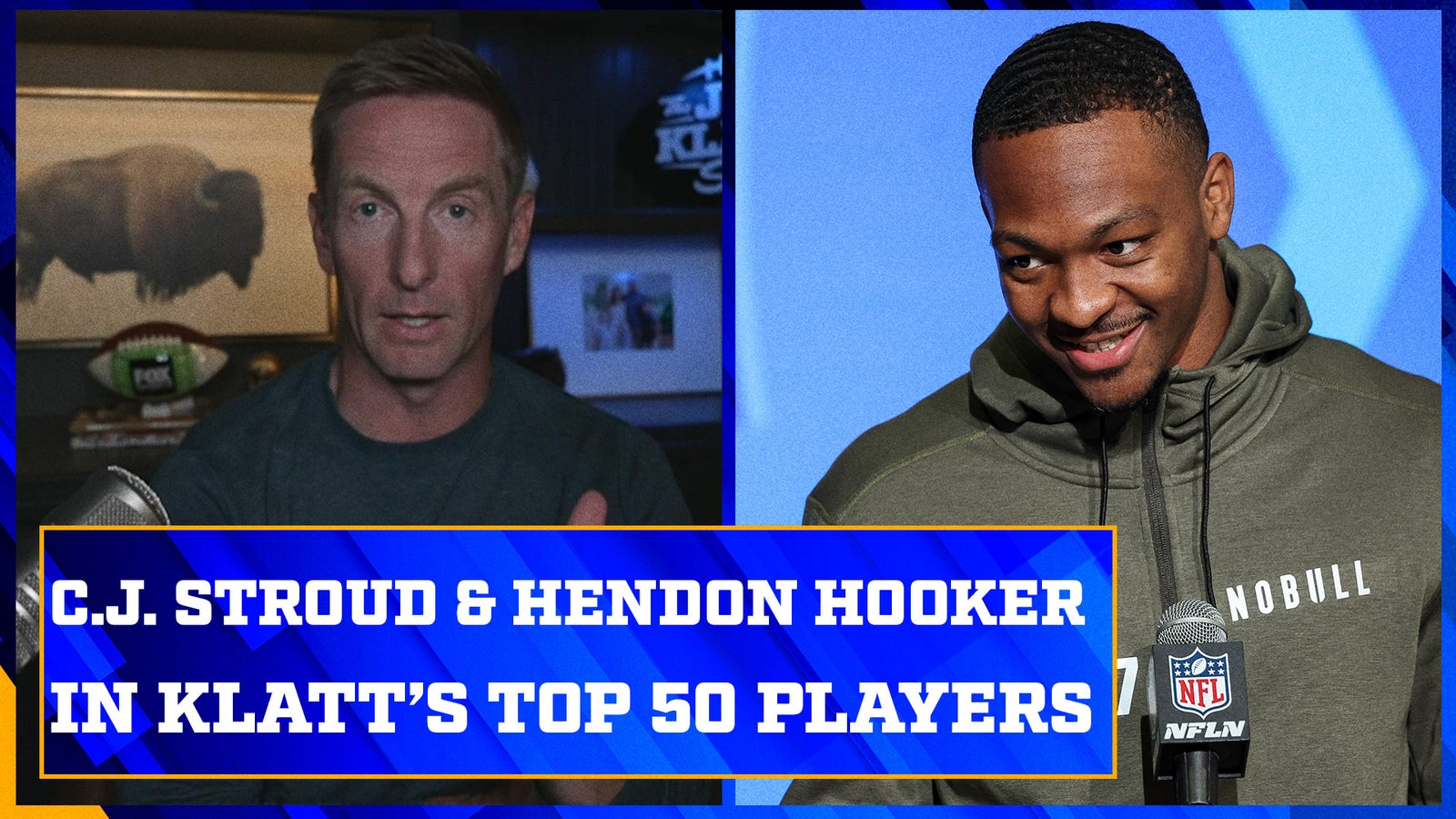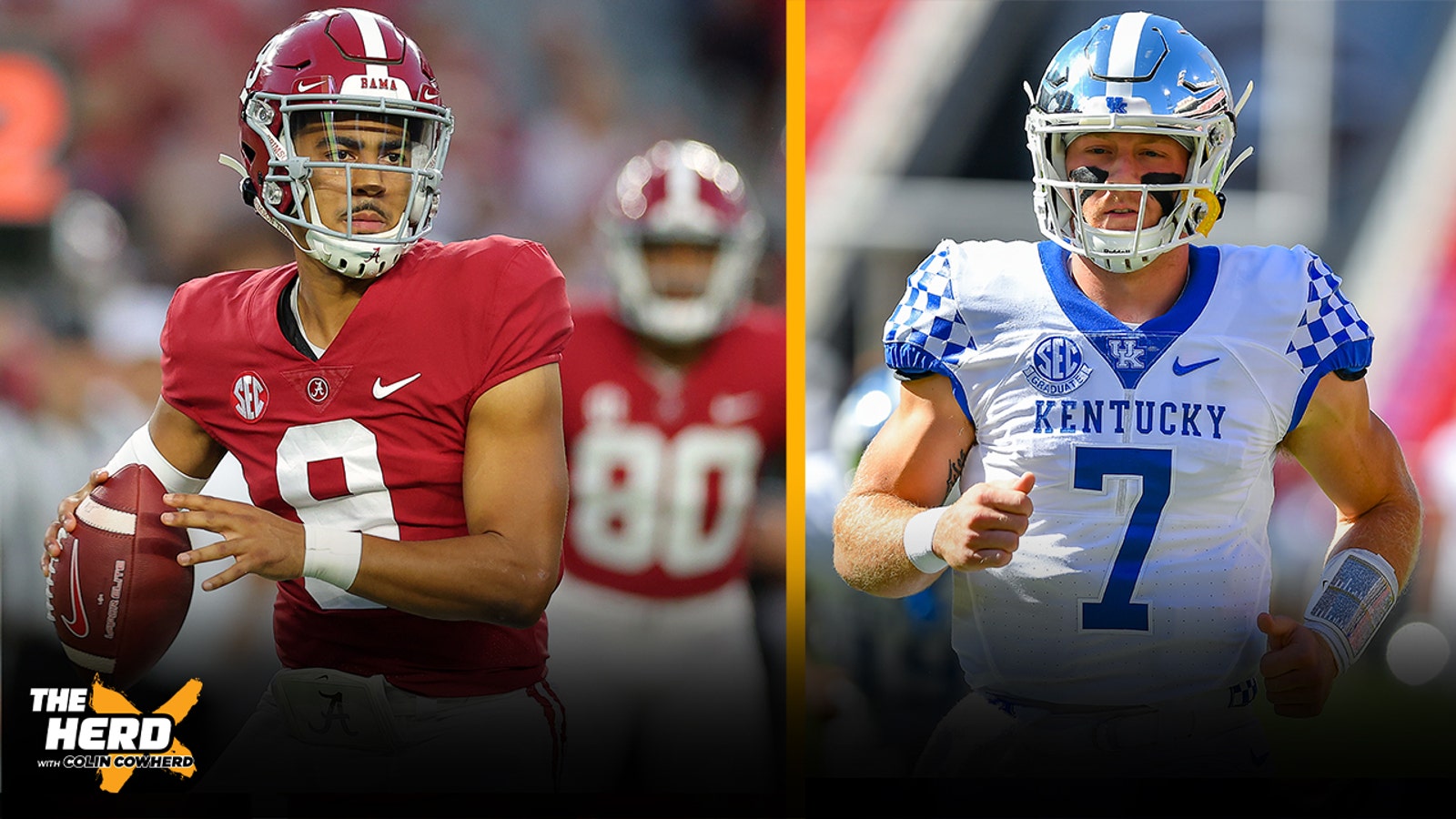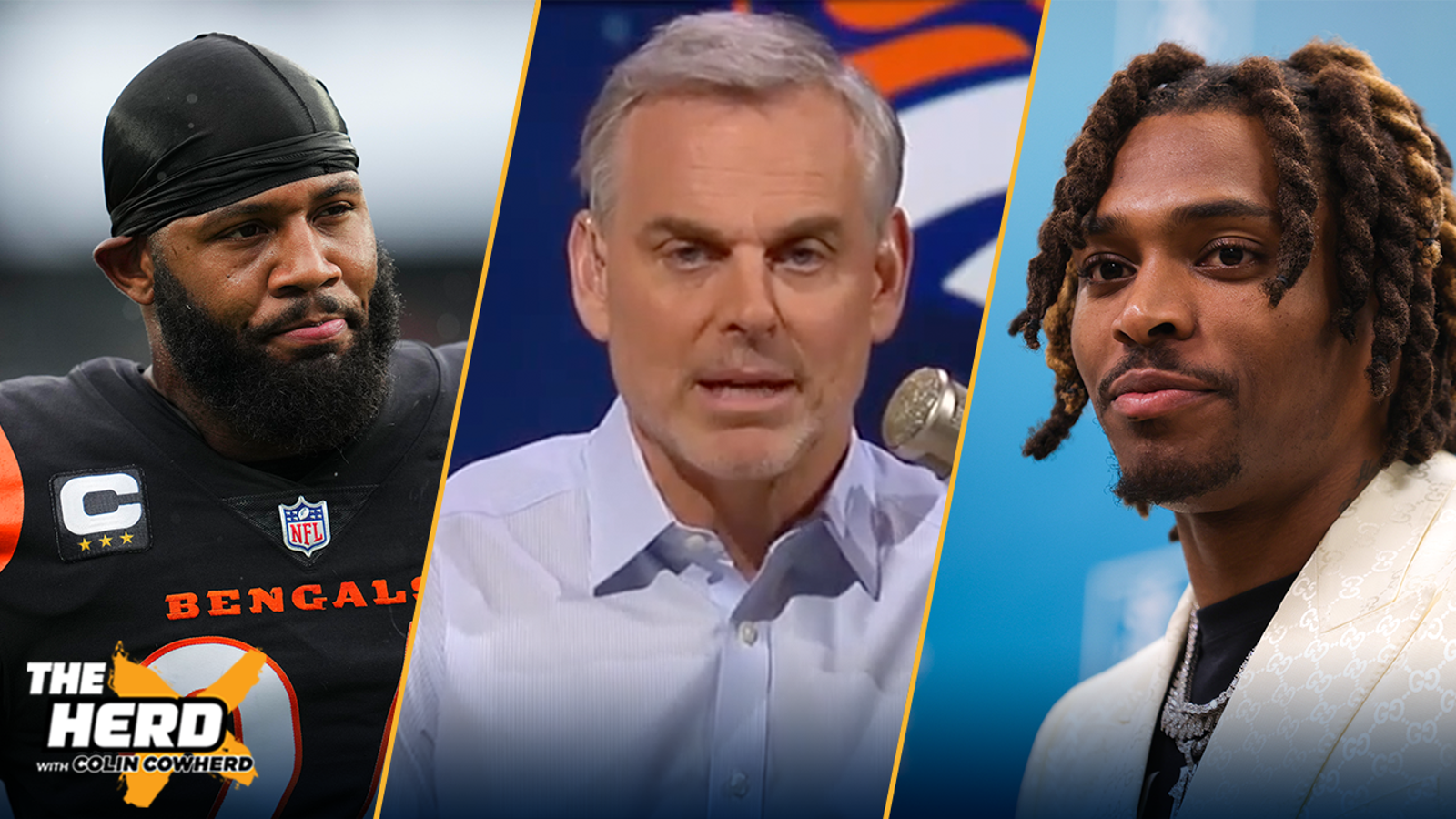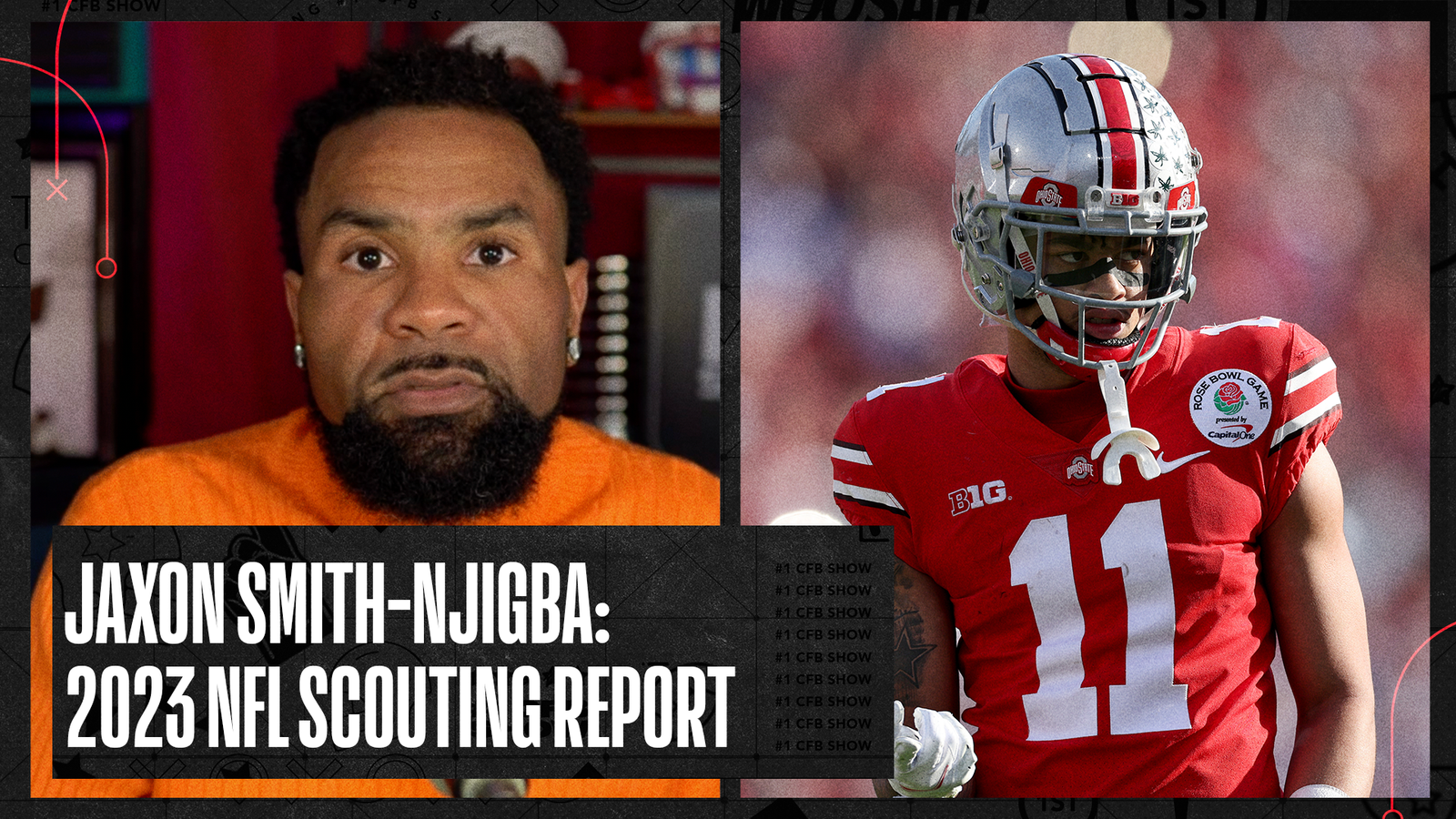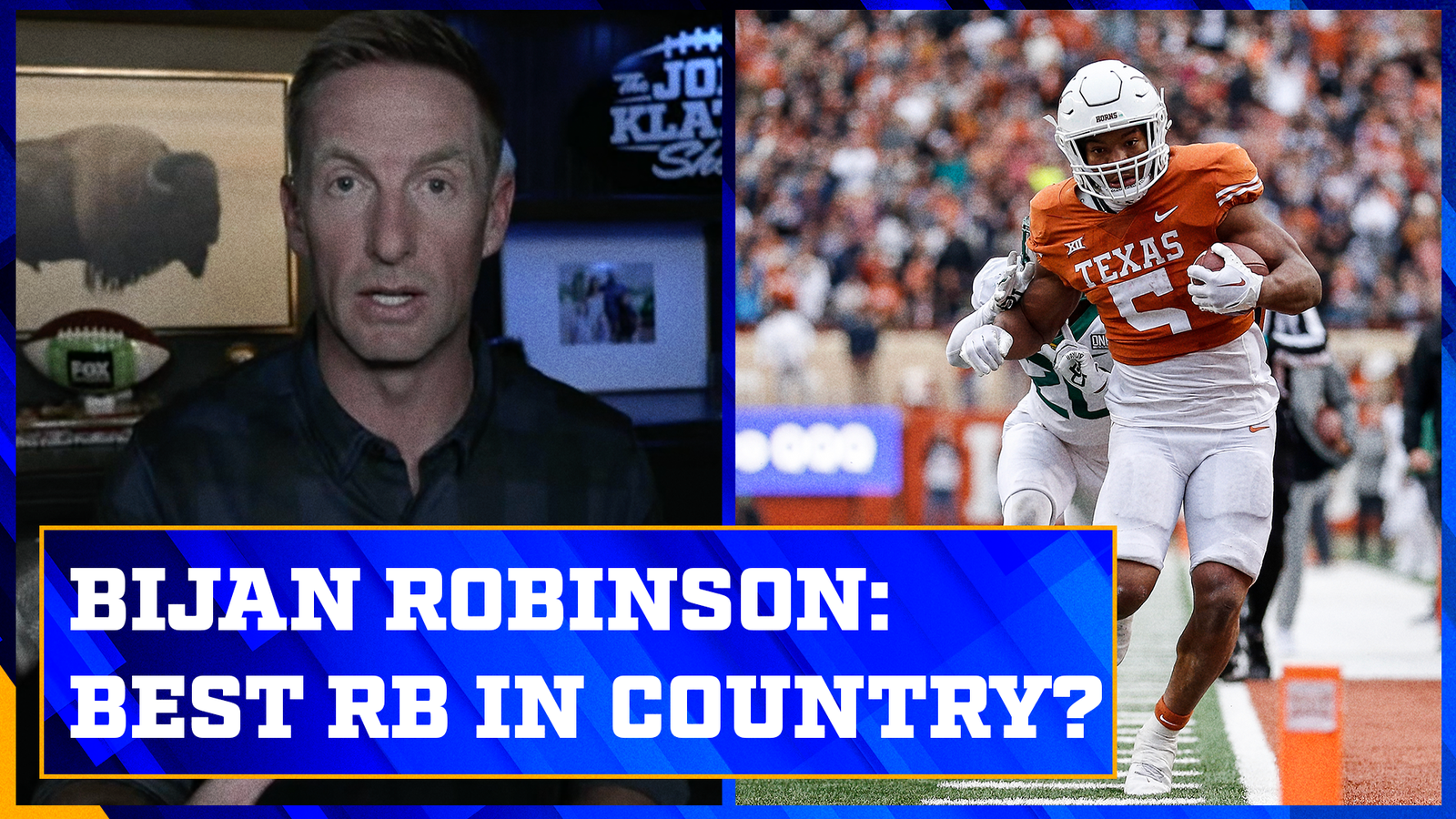Attempting a mock draft in a year with four quarterbacks projected to go in the top 10 picks provides an active reminder of how easy it is to be wrong — badly wrong — with these decisions.
NFL teams never invest more time and energy than in evaluating potential franchise quarterbacks at the top of the draft — if you don’t have one, you are constantly seeking one — and yet history tells us some or even many will fail in this effort.
You need only go back five years to see another draft class with four QBs in the top 10, and 2018 shows the absolute minefield that teams are now navigating. The No. 1 pick, Baker Mayfield, is on his fourth NFL team in nine months; the No. 3 pick, Sam Darnold, is on his third in the same short span. Buffalo certainly looks smart to have traded up for Josh Allen at No. 7; Arizona much less so for trading up to No. 10 for Josh Rosen, whose next NFL team will be his eighth.
And the guy with an MVP and a $200-million contract in his immediate future, Lamar Jackson, fell all the way to No. 32.
So it’s pure folly to think we know the answers for which quarterbacks are the correct answer for these top picks considering that the teams actually making the selections probably aren’t sure yet. This is about trying to predict what they’ll do, for better or worse, on April 27 when the picks come in.
1. Carolina Panthers (from Chicago): C.J. Stroud, QB, Ohio State
With two seasons in which he accounted for 40-plus touchdown passes, each with only six interceptions, all under a national spotlight, Stroud has put himself in position to be the logical top pick. He has a larger body of work than Florida‘s Anthony Richardson, and frankly, a larger body than Alabama‘s Bryce Young. Stroud’s 6-foot-3, 215-pound frame is closer to what coach Frank Reich has worked with.
ADVERTISEMENT
Carolina has Andy Dalton if Stroud isn’t ready right away, but this feels like the last three quarterbacks to go No. 1 — Trevor Lawrence, Joe Burrow and Kyler Murray were polished enough to play from the very first snap as the face of a franchise. The Panthers gave up a ton for the right to own this draft, and there will be plenty of due diligence in the next month, but the simplest answer is still Stroud.
Panthers send 11 to view C.J. Stroud at pro day
Carolina was well-represented at Ohio State’s Pro Day. Jeff Howe joins Colin Cowherd to discuss whether the Panthers should draft C.J. Stroud over Bryce Young, Will Levis and Anthony Richardson.
2. Houston Texans: Bryce Young, QB, Alabama
As we’ve said, Young could easily end up the best quarterback in this draft, but if Houston misses out at No. 2, the name to remember is Jordan Akins, the tight end who caught a touchdown and two-point conversion with 50 seconds left to give the Texans a 32-31 victory over the Colts in Week 18. That gave Chicago the No. 1 pick — and the windfall the Bears got for trading down. You can’t fault a player or coach for trying to win, but it leaves the Texans picking second, and for any doubts about his size (5-foot-10, 204 pounds), Young has 80 touchdowns against 12 interceptions in the past two years while playing with the highest expectations in the nation.
3. Arizona Cardinals: Will Anderson, Edge, Alabama
Much like Chicago, Arizona will be tempted to trade down and take a package of picks from a QB-needy team wanting to jump ahead of the Colts. Richardson could go to a team with a veteran quarterback in place short-term — maybe Seattle or Detroit, but those teams are good enough that they also might focus on building the best team for 2023. But we’ll leave the Cardinals at No. 3 and let them be content to get the best defensive player in the draft, in line with a defensive-minded new coach in Jonathan Gannon. Anderson had 17.5 sacks in 2021, and the Cardinals haven’t had a player under age 25 get a 10-sack season since Simeon Rice in 1998.
Joel Klatt’s top 50 players in 2023 NFL Draft
Joel Klatt breaks down his ranking of such players as Will Anderson, Bryce Young, C.J. Stroud, Hendon Hooker and many others.
4. Indianapolis Colts: Anthony Richardson, QB, Florida
Richardson oozes upside, but his athleticism and playmaking ability might be offset by a limited run as a starting quarterback. His 24 career touchdown passes would be the fewest by a QB drafted in the top 10 since Michael Vick, who had 21 when he was the first pick in 2001. The closest since are Trey Lance and Cam Newton, with 30 each. But for a franchise that has missed on quarterbacks on the decline at the end of their career, this is the exciting opposite, a home-run swing whether it clears the fences or not. The franchise has sorely missed that in the post-Andrew Luck era.
5. Seattle Seahawks (from Denver): Jalen Carter, DL, Georgia
The temptation is to take a quarterback, even with Geno Smith back and well-paid for 2023 as the starter. Pete Carroll is 71, so there’s a case to be made for maximizing the window to win now. Carter hasn’t helped himself this spring, on or off the field, but his game tape from Georgia is dominant, and the Seahawks drafted as well as anyone last year, giving them a strong, inexpensive nucleus for the next few years, with the NFC still glaringly the weaker conference. Can they outpace the 49ers and host playoff games in Seattle?
6. TRADE: Tennessee Titans (from Detroit): Will Levis, QB, Kentucky
It’s hard to imagine Ryan Tannehill returning after this season as the Titans rebrand. They’re close enough to move up and get their next quarterback in Levis. Tennessee has moved on from a ton of veterans this offseason, so the Titans package their top two picks (11 and 41) to get the No. 6 pick and a fifth-round pick back. Detroit now has four picks in the top 55, and Tennessee has a quarterback it can transition to over the next year.
Who will be the first QB taken in the 2023 NFL Draft?
Last month NFL Hall of Fame inductee Joe Thomas shared his thoughts on Alabama QB Bryce Young measuring at 5-foot-10 at the combine and on Kentucky prospect Will Levis.
7. Las Vegas Raiders: Christian Gonzalez, CB, Oregon
The Raiders have helped themselves in free agency, but they’ve neglected corner, and Gonzalez has 4.38 speed in the 40 and good size at 6-foot-1. Las Vegas’ defense matched the NFL low with just six interceptions last season, after an NFL-low six in 2021, so finding a corner with ball skills is a must. Gonzalez had four picks in a breakout year with the Ducks after transferring from Colorado.
8. Atlanta Falcons: Tyree Wilson, Edge, Texas Tech
Pass rush has been a glaring need for the Falcons, who have 23 fewer sacks than the next-closest NFL team over the past two years. Wilson is big enough to help Atlanta’s run defense as well, with 27.5 tackles for loss over his final two years with the Red Raiders. Finding a playmaking edge rusher is a bigger priority than offensive line, even with Atlanta’s choice of this year’s class at No. 8.
9. Chicago Bears (from Carolina): Paris Johnson, OT, Ohio State
This is the biggest return piece for the No. 1 overall pick, and adding the top tackle in the draft class matches up well with the Bears’ positional needs. Having added a top receiver for Justin Fields in DJ Moore, now they can ramp up the QB’s protection, with Johnson a solid upgrade on 2022 fifth-rounder Braxton Jones at left tackle.
Broncos, Dolphins, Bears top Colin’s NFL offseason rankings
Colin Cowherd ranks the six NFL teams he feels have made the best moves so far this offseason.
10. Philadelphia Eagles (from New Orleans): Myles Murphy, Edge, Clemson
There’s a more immediate need at safety, but the Eagles can get that with their next pick, and Murphy allows them to plan for the eventual loss of Brandon Graham. Philadelphia nearly broke the NFL record for sacks in 2022, but this keeps the Eagles young at the position.
11. TRADE: Detroit Lions (from Tennessee): Devon Witherspoon, CB, Illinois
Detroit needed to aggressively upgrade its defense, and adding corner Cam Sutton and safety Chauncey Gardner-Johnson are big steps toward that. But Witherspoon would allow the Lions to move on from Jeff Okudah. Had the Lions stayed put at No. 6, you could have seen them take a pass-rusher to pair with Aidan Hutchinson, but this is good value with an extra top-50 pick for another starter.
12. Houston Texans (from Cleveland): Jordan Addison, WR, USC
The Texans are being mentioned as a potential landing spot for DeAndre Hopkins, but absent that, they can use more help at receiver, with Robert Woods signed this month and John Metchie reportedly making great progress after missing his rookie season due to a leukemia diagnosis. Addison had a monster 2021 at Pitt — 100 catches for 1,593 yards and 17 touchdowns — and scored eight touchdowns last year as Caleb Williams‘ top target with the Trojans. Add in tight end Dalton Schultz and it’s a significantly upgraded group of targets for rookie QB Bryce Young.
13. New York Jets: Peter Skoronski, OT, Northwestern
He doesn’t last this long in most mock drafts, but it’s not a great year for offensive line prospects. The Jets have a real need for tackle help, with Mekhi Becton limited to one game in the past two seasons. If they’re adding Aaron Rodgers, protecting him will be a priority, and Skoronski can step in there right away. (There’s a chance the Jets will give up this pick as compensation for Rodgers, but for now we’ll keep it with them).
Is Aaron Rodgers not worth a first-round pick after all?
Some teams reportedly believe that Aaron Rodgers is not worth a first-rounder. Colin Cowherd breaks down the QB’s true worth.
14. New England Patriots: Broderick Jones, OT, Georgia
New England signed Riley Reiff to a $5 million deal, so there isn’t as big a need at tackle, but he’s 34 and a short-term answer at best. Jones is athletic enough to run the 40 in 4.97 seconds while weighing 311 pounds, and he gets ahead of what could be a decent run of tackles in the next 10 picks.
15. Green Bay Packers: Jaxon Smith-Njigba, WR, Ohio State
It’ll be amusing if Green Bay uses a first-round pick on a receiver as soon as it trades Aaron Rodgers, but losing Allen Lazard makes this an important position to upgrade for Jordan Love. Smith-Njigba missed most of 2022 with a hamstring injury but went off in 2021 with 95 catches for 1,606 yards and nine touchdowns. The Buckeyes have been a receiver factory of late, and that will only continue with Marvin Harrison Jr. next year.
Where will Ohio State’s JSN land in NFL Draft?
FOX Sports’ RJ Young is joined by NFL Draft Analyst Rob Rang to discuss the best running back and wide receiver prospects in this year’s class.
16. Washington Commanders: Michael Mayer, TE, Notre Dame
This is a strong year for tight ends, and Mayer topped 800 receiving yards in each of his last two years at Notre Dame, totaling 16 touchdowns. Washington’s best returning option is Logan Thomas, who had one touchdown last year, so it’s smart to give QB Sam Howell a reliable big target in addition to his talented receivers.
17. Pittsburgh Steelers: Joey Porter Jr., CB, Penn State
Porter could go a few spots earlier, but how cool is it to have a positional need line up with the son of a former Steelers player and coach? Porter has a great combination of size (6-foot-2) and speed (4.46 in the 40) to help Pittsburgh offset the loss of Cam Sutton in free agency. Patrick Peterson was signed as a free agent and can be a great mentor to Porter, whose father was an assistant on Mike Tomlin’s staff from 2014 to 2018.
18. Detroit Lions: Darnell Washington, TE, Georgia
Head coach Dan Campbell was a tight end, the Lions lost T.J. Hockenson and, most importantly, Washington is a beast. At 6-foot-7 and 264 pounds, he still ran a 4.64-second 40. He was Georgia’s second-best tight end, only because Brock Bowers will be a high draft pick in 2024. In theory, Detroit could trade down a few spots and still get Washington or Utah‘s Dalton Kincaid, who’s smaller but was more productive in college.
19. TRADE: Jacksonville Jaguars (from Tampa Bay): Deonte Banks, CB, Maryland
The Jaguars haven’t had the cap space to address much in free agency, and they cut corner Shaq Griffin loose, and adding Banks would allow them to keep Darious Williams at nickel, where he’s better suited. Jacksonville might be content to stay at No. 24 and hope he falls there, but a few teams between could take corners as well. The Jags give the Bucs a third-round pick, 88th overall, to move up five spots, but they have an extra fourth-rounder (from a trade with Tampa Bay last year) to help offset that.
20. Seattle Seahawks: Lukas Van Ness, Edge, Iowa
Even if Bruce Irvin re-signs, he’s 35, and Van Ness has the size (6-foot-5, 272) and power (nickname: Hercules) to help at end or outside linebacker. Oddly enough, he never started a game in college, so if he’s initially a situational player working his way into Seattle’s rotation (even at multiple spots), that will feel like home for him. If Van Ness is already gone, Georgia’s Nolan Smith would also make sense as a more traditional speedy pass-rusher.
21. Los Angeles Chargers: Bijan Robinson, RB, Texas
If the Chargers can find a trade partner for Austin Ekeler, this makes good sense, matching the top running back in the class with a team suddenly looking for a workhorse back. Los Angeles has Joshua Kelly and Isaiah Spiller, but Robinson — who rushed for 1,580 yards and 18 touchdowns last year — could step in as an immediate upgrade. QB Justin Herbert gets very expensive after this season, so this would be a chance to help keep the Chargers as a playoff team and make a splash in a difficult division.
Is Bijan Robinson the No. 1 RB in the draft?
Joel Klatt evaluates Bijan Robinson at the 2023 NFL Combine. Though Texas did not have a great offensive line last season, Robinson still may have been the best back in the country.
22. Baltimore Ravens: Quentin Johnston, WR TCU
Whether Lamar Jackson is the quarterback or not, Baltimore needs receiver help. Johnston has size (6-foot-3) and incredible athleticism (40.5-inch vertical). He also averaged 19 yards a catch over his three years with the Horned Frogs. His getting only six touchdowns out of the 32 Max Duggan threw last season is a concern, but he could end up as Baltimore’s most productive receiver.
23. Minnesota Vikings: Hendon Hooker, QB, Tennessee
Hooker is coming off an ACL injury, and there’s no need to rush him in with Kirk Cousins having one more year on his contract. Cousins took a step back in 2022, doubling his interceptions and managing four fewer touchdowns than he threw in 2021. He has a bit of a Derek Carr situation: eight years as a starter, seven seasons with 4,000-plus passing yards, but only one playoff win. If Cousins can’t add to that this season, it’s hard to see him coming back, and having a rookie quarterback will ease the massive hit of dead money against the Vikings’ cap in 2024 from Cousins’ oft-reworked contract.
24. TRADE: Tampa Bay Buccaneers (from Jacksonville): Brian Branch, S, Alabama
The Bucs could address the defensive front here, inside or outside, but they’ve left a big hole at safety opposite Antoine Winfield, and Branch would make a lot of sense filling that. Head coach Todd Bowles is a former safety, and he asks a lot of his safeties, so Branch’s football smarts are an asset, as is his overall versatility — he could be an answer at nickel corner as well. Tampa Bay has let Jordan Whitehead (Jets) and Mike Edwards (Chiefs) go in the past two years, so this is a chance to set up an elite pairing with Winfield.
25. New York Giants: Zay Flowers, WR, Boston College
As much as New York is investing in Daniel Jones, the Giants need to upgrade his skill-position talent, something they’ve started doing by trading for tight end Darren Waller and signing receiver Parris Campbell. Flowers is tiny (5-foot-9, 182) but fast enough that he might be the speed threat that Kadarius Toney wasn’t in his season-plus in New York.
26. Dallas Cowboys: Nolan Smith, Edge, Georgia
As a productive player on a super-talented defense, Nolan should go higher than this. He’s smaller (6-foot-2, 238) than most NFL pass-rushers, but is lightning-fast, still helps against the run and should do well in Dan Quinn’s defense. DeMarcus Lawrence turns 31 on draft weekend, and while the Cowboys brought Dante Fowler back, and like second-year defensive end Sam Williams, another young pass-rusher would upgrade their defensive front in what should again be a difficult NFC East.
27. Buffalo Bills: Drew Sanders, LB, Arkansas
Inside linebackers are perpetually devalued in the draft, and Buffalo needs a solid one after losing Tremaine Edmunds on a huge contract to the Bears. Sanders is 6-foot-4, taller than most NFL linebackers, and he had 103 tackles and 9.5 sacks in a breakout year for the Razorbacks. He has enough versatility that he could moonlight as a pass-rusher in sub packages.
28. Cincinnati Bengals: Darnell Wright, OT, Tennessee
This becomes an even more pressing need if the Bengals trade Jonah Williams, and Wright could end up going much higher. He’s still developing at his position but clearly showing a size (6-foot-5, 333) and athleticism (5.01 in 40) to set up potential long-term success. Offensive line has been a limiting factor for Cincinnati in the past two seasons, so adding talented depth is a must.
29. New Orleans Saints (from San Francisco through Miami and Denver): Calijah Kancey, DL, Pittsburgh
Kancey posted crazy numbers at the combine, running the 40 in 4.67 seconds while weighing 281 pounds. His quickness and position at Pitt will draw comparisons to Aaron Donald. New Orleans lost David Onyemata and Shy Tuttle in free agency, and did well to counter by signing Nathan Shepherd and Khalen Saunders, but Kancey would be a smart addition to its defensive front. The Saints lost enough on defense in free agency that this pick should address that side of the ball.
30. Philadelphia Eagles: Bryan Bresee, DT, Clemson
Javon Hargrave was the biggest of the Eagles’ many free-agent losses, so addressing the defensive front is a must, especially with Fletcher Cox now 32. Philadelphia drafted Jordan Davis last year, but it’s enough of a need to justify first-round picks in back-to-back seasons. Safety is a more glaring hole in Philadelphia’s lineup, but this isn’t a great year to find answers there in the first round.
31. Kansas City Chiefs: Dawand Jones, OT, Ohio State
With Andrew Wylie gone, there’s a need at right tackle. Jones is massive — 6-foot-8 and 374 pounds — and perhaps a better value than adding a speed receiver. It would also be intriguing to see Utah’s Dalton Kincaid go here as a second tight end to learn from and eventually succeed Travis Kelce in a crucial position in this offense. Jones measured with an 89-inch wingspan, the most ever for a Senior Bowl player, so he possesses a length and reach that could be dominating once his game is more polished.
Greg Auman is FOX Sports’ NFC South reporter, covering the Buccaneers, Falcons, Panthers and Saints. He is in his 10th season covering the Bucs and the NFL full-time, having spent time at the Tampa Bay Times and The Athletic. You can follow him on Twitter at @gregauman.
Top stories from FOX Sports:
NFL trending

Get more from National Football League Follow your favorites to get information about games, news and more

